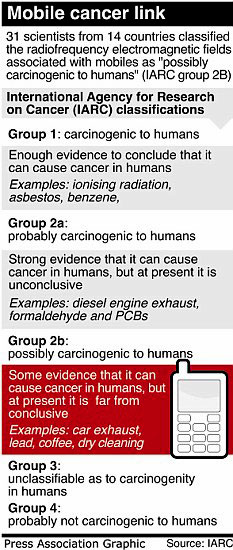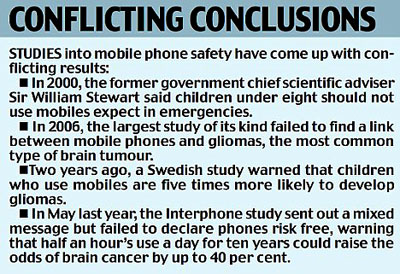|

by Fiona Macrae
June 01, 2011
from
DailyMail Website
|
Mobile Phones May Cause
Cancer,
Warn World Health Chiefs.
After Years of Contradictory
Claims,
An Authoritative Verdict. |
Mobile phone owners were urged to limit
their use last night after the World Health Organization
(WHO) admitted they may cause cancer.
The UN’s health agency advised ‘pragmatic’ measures to reduce
exposure, such as using hands-free kits and texting instead of
calling.
The disturbing report marks the first time the WHO has linked
mobiles with cancer, and follows earlier research linking just half
an hour’s use a day with up to 40 per cent higher odds of brain
cancer.
However the mobile phone industry was quick to point out that the
devices had not been directly shown to cause cancer. More than
70million mobile phones are now in use in Britain - more than one
for every man, woman and child. Worldwide, the total tops five
billion.
Dr Christopher Wild, director of the
WHO’s International Agency for
Research on Cancer (IARC), said:
‘Given the potential consequences
for public health, it is important that additional research be
conducted into the long-term, heavy use of mobile phones.
‘Pending the availability of such information, it is important
to take pragmatic measures to reduce exposure, such as
hands-free devices and texting.’
IARC’s conclusion follows a week-long
review of all available scientific evidence by 21 scientists from 14
countries, including fresh research that has yet to be published.
The working group concluded that mobile phone use is ‘possibly
carcinogenic’, a term which places the phones in the middle of five
tiers of possible carcinogens.
They are below smoking, asbestos, sun-beds and other things which
definitely cause cancer, but still a potential risk.

Cancer risk of
mobiles
The review’s results could lead to the
WHO redrawing its guidelines on mobile phone use. Until now, it has
stated that there are no adverse health effects associated with it.
Dr Jonathan Samet, chairman of the working group, said while
the evidence is still accumulating, it is strong enough to support
the classification.
He added:
‘The conclusion means that there
could be some risk and therefore we need to keep a close watch
for a link between cell phones and cancer risk.’
The working group did not quantify the
risk - but pointed to a study from last year that linked just half
an hour of mobile phone use a day for ten years with an increased
use of
glioma, a type of brain tumor.
Some of the scientists behind that research said the figures were
flawed and urged people not to worry, but others warned against
dismissing the link.
Professor Denis Henshaw, a Bristol University radiation
expert, said at the time:
‘Why should it come as a surprise
that pressing mobiles to people’s ears increases the risk of
brain tumors?’
The new review also found a possible
link between mobile phones and non-cancerous tumors of the nerve
that transmits information about sound from the ear to the brain.
‘Children should only use mobile
phones for essential purposes and keep all calls short.’

MOBILE PHONE
DO's
-
Keep your mobile phone in your
bag rather than in your pocket or next to your body. One
study shows that men who wear cell phones near their groin
risk reductions in their sperm count by up to 30 per cent.
-
Send text messages or email
where possible - don’t lean it against your body as you do
so.
-
Use a wireless headset. Moving
your phone 20cm away from your head reduces radiation doses
by about 98 per cent
-
Keep still when you’re using it.
If you’re on the move, whether walking or in a vehicle, your
phone needs to use more radiation to keep track of you.
-
Hold it away from you after
dialing and watch the screen to see when it connects. Most
phones emit more radiation when they’re trying to make
contact.
-
Go low-tech. The more
sophisticated functions your phone has, the more power it
must use to complete tasks.
MOBILE PHONE
DON'Ts
-
Talk for hours on end. The
longer you use the phone, the higher a dose of radiation
your brain is soaking up. Even a two-minute call has been
found to alter the natural electrical activity of the brain
for up to an hour afterwards.
-
Use a regular wired headset,
like the one that came with your phone. The regular wired
headset has been found to intensify radiation into the ear
canal.
-
Allow your children unlimited
mobile phone use. Young brains encased in thinner, more
fragile skulls risk greater damage
-
Do not make a call when the
signal strength is one bar or less. The phone must work
harder to establish a connection.
-
Use the cell phone in enclosed
metal spaces such as vehicles or elevators, where devices
may use more power to establish connection.
-
The metal enclosure also acts as
a Faraday cage that traps the radiation and reflects it back
on to the occupants.
A CHORUS OF WARNINGS
How mobile phone radiation could be the next big
public health crisis
The safety risks of mobile phones is a
matter of constant contention between scientists and grave concern
for consumers.
Just a fortnight ago an influential Council of Europe committee
warned mobile phones and wireless internet should be banned from
schools because they pose too great a risk to children’s health.
The Council’s Committee on the Environment, Agriculture and Local
and Regional Affairs drew up a draft resolution urging governments
to ‘take all reasonable measures to reduce exposure to
electromagnetic fields’ from mobile phones and similar devices.

Danger:
A committee set up by
the Council of Europe believes that
mobile phones should
be banned from schools as they affect the developing brain
In March, in the Government's first
update to the UK Mobile Phones and Health leaflet since 2005,
officials for the first time warned mobile phone users to text or
use hands free kits rather than make calls.
The Department of Health said this would reduce the user's exposure
to reduce radiation emitted by the devices. It stated there had been
no 'clear evidence of adverse health effects' from the use of
mobiles or from phone masts.
However, it added:
'As people have only been using
mobile phones for relatively few years, the HPA advises that
more research be carried out, especially to investigate whether
there might be longer term effects.'
The UK Chief Medical Officer restated
previous advice that children under the age of 16 should only use
mobile phones for 'essential purposes' and should 'keep calls
short.'
This was described as a 'precautionary' move as teenagers' bodies
and nervous systems are still developing. But a month earlier a
University of Manchester study found there was no link between
mobile phone use and increased levels of brain cancer.
A study by scientists at the university looked at data from the
Office of National Statistics on rates of newly diagnosed brain
cancers in England between 1998 and 2007.

Government advice:
Mobile phone users
are now encouraged to use hands-free kits
or text rather than
holding phones to their heads
It found no statistically significant
change in the incidence of brain cancers in men or women during the
nine-year period.
Lead researcher Dr Frank de Vocht, an expert in occupational
and environmental health in the University of Manchester’s School of
Community-Based Medicine, said a cancer epidemic was unlikely.
He said:
'Our findings indicate that a causal
link between mobile phone use and cancer is unlikely because
there is no evidence of any significant increase in the disease
since their introduction and rapid proliferation.'
But at the end of 2010 a startling
survey warned pregnant women who regularly use mobile phones could
increase the risk of their children behaving badly.
If their offspring then start using the devices at an early age, the
chance of problems climbs to 50 per cent, according to findings
published in the Journal of Epidemiology and Community Health
Researchers in California found those exposed to mobile phones in
the womb had a 30 per cent rise in behavioral difficulties at the
age of seven. But those exposed before birth and in their childhood,
were 50 per cent more likely to have behavioral problems than those
exposed to neither.

Pregnant pause:
Researchers suggest
that pregnant women who regularly use mobile phones
are putting their
babies at risk of developing behavioral problems
Children who used mobiles, but were not
exposed in the womb, were 20 per cent more likely to display
abnormal behavior.
These latest studies have just contributed to a contradictory canon
of research into mobile phone safety.
As far back as 2000, a Government-funded report found that while
there was no concrete proof that mobile phones were harmful to
health, use of the devices should be limited.
Most scientists say it is still too early to tell whether mobile
phones are safe in the long-term, and the the Government's Mobile
Telecommunications and Health Research Program is still calling for
further research.
|





